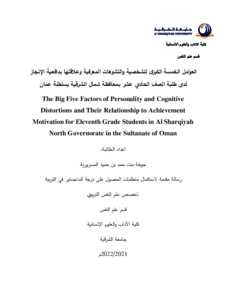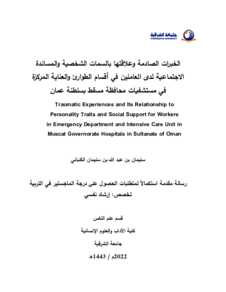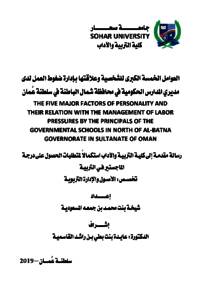وثيقة
الهناء الشخصي وعلاقته بالعوامل الخمسة الكبرى للشخصية لدى طلبة جامعة نزوى.
المصدر
رسالة ماجستير
عناوين أخرى
The relationship between subjective well-being and the five big factors of personality among students of University of Nizwa
الدولة
عمان
مكان النشر
نزوى
الناشر
جامعة نزوى
ميلادي
2016
اللغة
اللغة العربية
الموضوعات (الاسم)
نوع الرسالة الجامعية
رسالة ماجستير
الملخص الإنجليزي
The study aims to investigate the relationship between subjective well-being and its two dimensions which are cognitive (life satisfaction) and affective (happiness), and the big five factors of personality (openness to experience, conscientiousness, extraversion, agreeableness, and neuroticism) among students in University of Nizwa. The study is conducted to determine the level of subjective well-being, cognitive and affective dimensions to the students of the University of Nizwa, as well as identifying personal qualities peculiar of students of the University of Nizwa, reflected in performance on a scale of five major factors of personality (Neuroticism, Extraversion, Agreeableness, Openness to Experience, Consciousness). Additionally, a random sample was selected for the study in size of 400 students including 170 male, 230 were using subjective well-being (mortgaged, 2011), the five major factors scale profile of Costa and McCrea 1992 localizations Ansari (2002). Furthermore, after processing the data statistically using SPSS statistical package, the study found several results, including the level of subjective well-being. As a result, Nizwa University students, come to a high degree on all axles, and that five major ranking factors profile among university students in Nizwa come in accordance with the following order; consciousness, openness to experience, agreeableness, extraversion, neuroticism, where the results of the study show that the predominant factor in Nizwa University is a Consciousness.
As this study aims to reveal the nature of the relationships between personal well- being (ingredients), the big five factors of personality in the study sample of students from the University of Nizwa, and the results of the study show the variable happiness statistically positive associated both with extraversion (0.01), openness to experience (0.01), and conscientious (0.01). While the statistical significance of the correlation coefficients between happiness, neuroticism and agreeableness variables are absent, as well as the results show the absence of differences in subjective wellbeing variables (full mark), happiness and life satisfaction among males and females.
الملخص العربي
هدفت الرسالة إلى بحث العلاقة بين الهناء الشخصي بمكونيه المعرفي الرضا عن الحياة)، والوجداني (السعادة) والعوامل الخمسة الكبرى للشخصية (العصابية، الانبساط الانفتاح على الخبرة الطيبة، يقظة الضمير) لدى طلبة جامعة نزوى، وتحديد مستوى الهناء الشخصي، وسمات الشخصية المميزة لطلبة جامعة نزوى، وتم اختيار عينة عشوائية للدراسة حجمها ٤٠٠ طالب وطالبة منهم ١٧٠ ذكر ، ٢٣٠ أنثى، وتم استخدام مقياس الهناء الشخصي (المرهون (۲۰۱۱)، ومقياس العوامل الخمسة الكبرى للشخصية لكوستا وماكري ۱۹۹۲
تعريب الأنصاري (۲۰۰۲)، وبعد معالجة البيانات إحصائيًا باستخدام الرزمة
الإحصائية SPSS ، توصلت الدراسة إلى العديد من النتائج أهمها: أن مستوى الهناء الشخصي لدى طلبة جامعة نزوى جاء بدرجة عالية في جميع المحاور، وأن ترتيب العوامل
الخمسة الكبرى للشخصية لدى طلبة جامعة نزوى جاء وفق الترتيب الآتي: يقظة الضمير الانفتاح على الخبرة الطيبة الانبساط العصابية، إذ أظهرت نتائج الدراسة أن العامل السائد لدى طلبة جامعة نزوى هو عامل يقظة الضمير، كما أظهرت نتائج الدراسة أن متغير السعادة ارتبط إيجابيًا بدلالة احصائية مع كل من الانبساط الانفتاح على الخبرة، ويقظة الضمير في حين غابت الدلالة الاحصائية عن معاملات الارتباط بين السعادة ومتغيري العصابية والطيبة وكذلك أظهرت النتائج عدم وجود فروق دالة احصائيا في مكوني الهناء الشخصي (الدرجة
الكلية)، والسعادة والرضا عن الحياة بين الذكور والإناث.
تعريب الأنصاري (۲۰۰۲)، وبعد معالجة البيانات إحصائيًا باستخدام الرزمة
الإحصائية SPSS ، توصلت الدراسة إلى العديد من النتائج أهمها: أن مستوى الهناء الشخصي لدى طلبة جامعة نزوى جاء بدرجة عالية في جميع المحاور، وأن ترتيب العوامل
الخمسة الكبرى للشخصية لدى طلبة جامعة نزوى جاء وفق الترتيب الآتي: يقظة الضمير الانفتاح على الخبرة الطيبة الانبساط العصابية، إذ أظهرت نتائج الدراسة أن العامل السائد لدى طلبة جامعة نزوى هو عامل يقظة الضمير، كما أظهرت نتائج الدراسة أن متغير السعادة ارتبط إيجابيًا بدلالة احصائية مع كل من الانبساط الانفتاح على الخبرة، ويقظة الضمير في حين غابت الدلالة الاحصائية عن معاملات الارتباط بين السعادة ومتغيري العصابية والطيبة وكذلك أظهرت النتائج عدم وجود فروق دالة احصائيا في مكوني الهناء الشخصي (الدرجة
الكلية)، والسعادة والرضا عن الحياة بين الذكور والإناث.
قالب العنصر
الرسائل والأطروحات الجامعية



